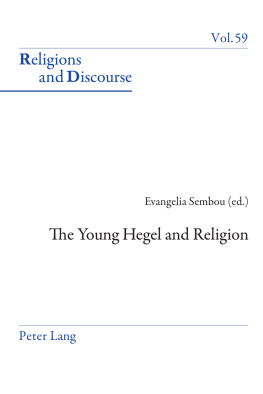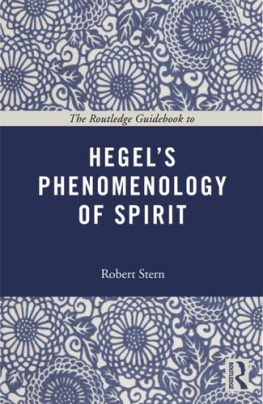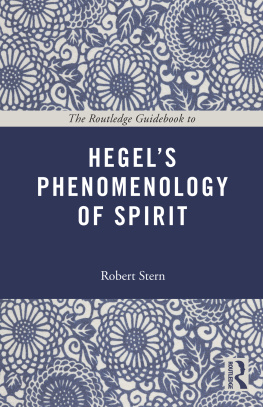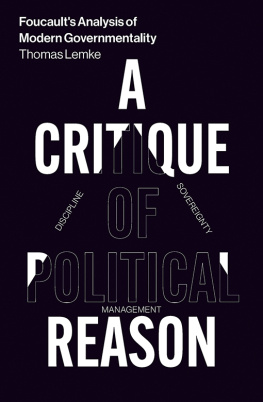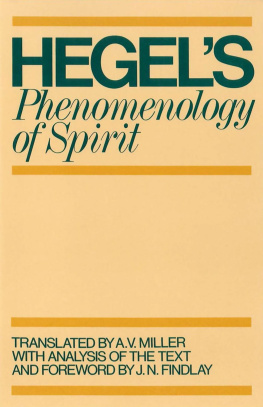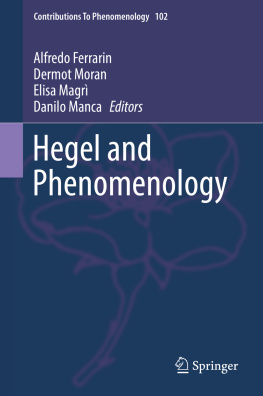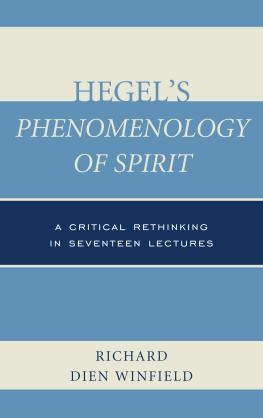HEGELS PHENOMENOLOGY
AND FOUCAULTS GENEALOGY
Classical and Contemporary
Social Theory
Series Editor: Stjepan G. Mestrovic, Texas A&M University, USA
Classical and Contemporary Social Theory publishes rigorous scholarly work that re-discovers the relevance of social theory for contemporary times, demonstrating the enduring importance of theory for modern social issues. The series covers social theory in a broad sense, inviting contributions on both classical and modern theory, thus encompassing sociology, without being confined to a single discipline. As such, work from across the social sciences is welcome, provided that volumes address the social context of particular issues, subjects, or figures and offer new understandings of social reality and the contribution of a theorist or school to our understanding of it. The series considers significant new appraisals of established thinkers or schools, comparative works or contributions that discuss a particular social issue or phenomenon in relation to the work of specific theorists or theoretical approaches. Contributions are welcome that assess broad strands of thought within certain schools or across the work of a number of thinkers, but always with an eye toward contributing to contemporary understandings of social issues and contexts.
Also in the series
The Gift and its Paradoxes
Beyond Mauss
Olli Pyyhtinen
Marx and Weber on Oriental Societies
In the Shadow of Western Modernity
Lutfi Sunar
The Puritan Culture of Americas Military
U.S. Army War Crimes in Iraq and Afghanistan
Ronald Lorenzo
Liquid Sociology
Metaphor in Zygmunt Baumans Analysis of Modernity
Edited by Mark Davis
Hegels Phenomenology and Foucaults Genealogy
EVANGELIA SEMBOU
First published 2015 by Ashgate Publishing
Published 2016 by Routledge
2 Park Square, Milton Park, Abingdon, Oxon OX14 4RN
711 Third Avenue, New York, NY 10017, USA
Routledge is an imprint of the Taylor & Francis Group, an informa business
Copyright 2015 Evangelia Sembou.
Evangelia Sembou has asserted her right under the Copyright, Designs and Patents Act, 1988, to be identified as the author of this work.
All rights reserved. No part of this book may be reprinted or reproduced or utilised in any form or by any electronic, mechanical, or other means, now known or hereafter invented, including photocopying and recording, or in any information storage or retrieval system, without permission in writing from the publishers.
Notice:
Product or corporate names may be trademarks or registered trademarks, and are used only for identification and explanation without intent to infringe.
British Library Cataloguing in Publication Data
A catalogue record for this book is available from the British Library
The Library of Congress has cataloged the printed edition as follows:
Sembou, Evangelia.
Hegels Phenomenology and Foucaults Genealogy / by Evangelia Sembou.
pages cm. (Classical and contemporary social theory)
Includes bibliographical references and index.
ISBN 978-1-4094-4308-7 (hardback) ISBN 978-1-4094-4309-4 (ebook) ISBN 978-1
4724-0601-9 (epub) 1. Hegel, Georg Wilhelm Friedrich, 1770-1831. Phdnomenologie des
Geistes. 2. Foucault, Michel, 1926-1984. 3. Genealogy (Philosophy) I. Title.
B2929.S455 2015
193dc23
2014020769
ISBN: 978-1-409-44308-7 (hbk)
Contents
Preface and Acknowledgements
The book reflects my own philosophical itinerary. I studied Hegels 1807 Phenomenology and political philosophy as a graduate student at The University of Edinburgh during the academic year 19956. There I attended a course jointly taught by Mr. Richard Gunn and Dr. Kimberly Hutchings, and spent much fruitful time discussing Hegels Phenomenology with Dr. Kimberly Hutchings at tutorials. While at Edinburgh I also wrote my Masters dissertation on the genealogies of Nietzsche and Foucault, also under the supervision of Dr. Kimberly Hutchings. In addition, at Edinburgh I benefited from a course on the philosophy of social sciences (the continental tradition) taught by Dr. Martin Kusch, from discussions with such social theorists as Dr. John Holmwood and Dr. John Orr, as well as from the work of Professor Russell Keat. I went on to write my doctoral thesis on Hegels Phenomenology of Spirit with Professor Lord Plant at the University of Oxford (19962000). Obviously, I am indebted to all the above people for their constructive criticism, advice and encouragement. I have published articles on Hegel, as well as on Hegel and Foucault, and have presented my work on these topics at international conferences and workshops. I have also published a revised version of my doctoral thesis on Hegels Phenomenology of Spirit (2012). Moreover, I have benefited from attending the conferences of the Hegel Society of Great Britain. Many of the issues discussed in the book were re-thought while I was a tutor at Oxford University (20032007) and developed by independent study thereafter. Therefore, this book is the culmination of my intellectual development so far. Finally, and not least, I would like to thank Ashgate for making this book possible, the anonymous reviewers, Matthew Irving, the editor at Ashgate and Pam Bertram for preparing the index.
Prologue
The purpose of this book is to compare and contrast Hegels phenomenology with Foucaults genealogy. It sets out to explore the merits and demerits of each of these two approaches, with a view of benefiting from the combination of their respective strengths. To many it will seem that this project, if not impossible, is at least fraught with difficulties from the very beginning. Hegelian phenomenology and Foucauldian genealogy have traditionally represented two different strands in continental philosophy. On the one hand, Hegelian phenomenology is about human conscious experience (the experience of consciousness). On the other hand, Foucauldian genealogy has its roots in Nietzsches On the Genealogy of Morals, which traces origins in order to question entrenched beliefs and values. Hegel is a modernist and systematic thinker; at the same time, he is associated with teleological grand narratives. By contrast, Foucault is a post-modernist thinker, a post-structuralist and deconstructionist. Moreover, Hegels rigorous, austere and academic style contrasts sharply with Foucaults unsystematic, provocative and gripping manner. Besides, in his remarks that are scattered in his works Foucault has often been very critical of Hegelianism, albeit at times quite ambiguous (e.g. Foucault 1966: 318, 338, 339, 342, 345; 2002a: 335, 356, 357, 361, 364; 1971: 7479; 1981: 4877; 1994c: 145; 1980: 114115; 1994d: 43, 48, 4950; 2002b: 241, 246247, 248, 249; 2001: 2930, 466467; 2005: 28, 477479). Yet, Foucault has had to define himself vis--vis Hegel and his thought relates to Hegelianism in significant ways. In this connection, it should not be forgotten that Foucaults directeur de doctorat was Jean Hyppolite, with whom he enjoyed a long relationship and who was one of the greatest French interpreters of Hegel.
Central to my argument is that, despite their manifold differences, Hegelian phenomenology and Foucauldian genealogy make a common contribution to philosophy; they go beyond such distinctions as subject/object, theory/praxis, universal/particular, reason/nature and mind/body distinctions that have characterized all traditional philosophizing. The foregoing dichotomies are part and parcel of foundational thinking, and the main thesis of this book is that Hegels phenomenology and Foucaults genealogy point the way toward a non-foundational knowledge.



